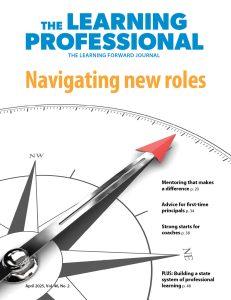Over the past several weeks, Learning Forward has listened as educators in our COVID-19 webinars, our online community, and individual conversations have shared that they need support. They need support in teaching online, they need support in connecting virtually, they need support in fulfilling their students’ needs. And this support is needed now. We hear you and see evidence that policy makers hear you as well. However, as we look past this crisis point to when education systems resume standard operations, it is important to distinguish emergency training from true professional learning.
The U.S. Department of Education’s recent streamlined waiver announcement allows states to request waivers of the Every Student Succeeds Act’s (ESSA’s) professional development definition for the remainder of this school year. The waiver is in response to educators’ urgent need for virtual teaching support right now. It is a short-term measure that will help to address immediate needs.
Learning Forward – which helped write the professional learning definition – will continue to advocate for adherence to the definition’s vision of ongoing, job embedded, sustained professional learning. However, given the world into which COVID-19 has thrust us all, Learning Forward agrees that this waiver is needed to allow schools and districts to quickly and expeditiously respond to educators’ need for immediate supports. The world was caught off guard by COVID-19 and the education community was as well. The education stabilization dollars and flexibility for how funds are used are critical right now.
Some might ask then: if Learning Forward supports this waiver, does this mean that we have lowered our standards on what makes for effective professional learning? The answer to that question is absolutely not. We recognize that educators who have not had access to ongoing, job embedded, sustained professional learning related to distance learning prior to the pandemic need to experience stop-gap training to fill that void. And we commend schools and districts who are moving quickly to provide that training and equipment to educators.
However, while the waiver of the definition of ESSA professional development will allow schools to quickly provide much-needed support for educators today, short-term training cannot supplant good professional learning. One-time or short-term workshops can have value to convey information rapidly or on a widespread scale but play only a part in long-term effective professional learning.
Training does not typically encourage active engagement of learners or take into account individual learners’ specific needs or learning preferences, for instance. But when training days or workshops are reinforced with follow-up learning and support among peers or with coaches, educators are more likely to retain new knowledge or gain new skills, and the combination of strategies brings us closer to what know makes a difference in professional learning.
Learning Forward looks forward to the day when we can take the elements of effective professional learning– ongoing, job-embedded, data driven, and collaborative – and the lessons we have learned from the pandemic and combine them for a new long-term strategy for professional learning. This will include virtual supports for professional learning – virtual coaching, virtual peer observations, virtual collaboration, and facilitated online communities – along with a focus on how to ensure meaningful student learning in digital environments.
Something that has stuck with me throughout this pandemic is this idea that we don’t want to return to the imperfect education reality that we had. Let’s use the lessons learned through this crisis to build for an effective and equitable future. Professional learning is a great place to start as we envision an innovative, more responsive “new normal.” If we can reach every educator with the just-in-time professional learning that they need and provide it in an environment, in-person or virtually, that is collaborative and supportive, we will succeed in not just surviving the pandemic but moving forward as a result of it. This is good for educators and it is good for students.
Melinda George is Learning Forward’s chief policy officer.
See Learning Forward’s growing collection of resources, webinars, and the online community created to support educators at this time.








